By Andrew Bolt, Herald Sun
No wonder global warming prophets such as Al Gore, Greenpeace and Clive Hamilton dodge debates. Warming worrier Richard Littlemore of DeSmogBlog.com runs up the white flag after a radio debate with sceptic Christopher Monckton:
In hindsight, I played perfectly into the hands of Monckton and his happy radio host, Roy Green, who share the same goal - not to win an argument about global warming science, but merely to show that there still IS an argument. Of course there’s not. But while we danced angels around the head of a pin, I can imagine Green’s listeners thinking, “Oh my. This is very confusing. No wonder the government says it’s too early to take action.” Score one for Monckton....
It was also a tactical error to start pointing people to helpful websites with clear graphs and reliable science that could support my position. It left open the possibility for Monckton to say, “I could produce 35 graphs” to the contrary - which fiction then drifted to the listeners as if it were, well, accurate in the real world.
Thanks (and my apologies) to those of you who volunteered some much-preferable debating strategies. Maybe next time.
Hear the debate here. Or read it here.
UPDATE
I really don’t think Littlejohn was ever going to win after this opening salvo from Monckton:
Well let’s first of all begin on this question of funding, and let us talk about the funding for DeSmog Blog. Now DeSmog Blog was founded with $300,000 of money from a man called John Lefebvre who is an Internet gaming fraudster convicted last year of making hundreds of millions of dollars - a large chunk of which he is now being made to pay back to the government - by unlawfully laundering money to do with unlawful Internet gaming.
He is the person who got into bed with Mr. Littlemore’s boss at a PR [public relations] company, a Mr. James Hoggan (ICECAP NOTE: Chairman of the board of the radical David Suzuki Foundation and whose PR company promotes numerous alternaive energy companies), and they took up the DeSmog Blog, whose job of course is not to debate the science of climate, but to inaccurately misrepresent the alleged or supposed or imagined funding of anyone who dares to challenge the supposed consensus on the climate. So let’s get that thing clear first of all. DeSmog Blog was founded, is funded, and is run by a convicted and self-confessed crook, and furthermore that crook is now in the business of running a solar energy corporation and therefore has a direct vested interest in peddling the climate change scare.
I would start by making it clear that Mr. Littlemore is a public relations executive working for a convicted Internet fraudster.
And then Monckton got stuck into the evidence. Read on for sheer enjoyment.
But this trashing of global warmers in a debate has happened before, of course. Ask Michael Crichton.
See post here.
----------------
Lord Monckton Responds to Abraham Attack About Global Warming Science- Press Release
By Bob Ferguson, SPPI
Christopher Monckton has issued an extensive and detailed critique and refutation of a widely-circulated 83-minute personal attack on him by one J.P. Abraham, a lecturer in fluid mechanics at the University of St. Thomas, Minnesota.
Professor Abraham’s 83-minute lecture with 115 slides purported to demolish a talk about climate change that Lord Monckton had given in St. Paul, Minnesota, in October 2009. More than 2.5 million people have seen Moncktonís talk on YouTube, making it one of the most popular viewings on the web.
In June 2010, Abraham posted up an attack on the internet via the servers of the University of St. Thomas. Within a week, Monckton’s 84-page letter with its near-500 questions was in the Abraham’s hands, to which he has not responded as challenged.
Monckton publicly accuses Abraham of -
∑ Bad faith in having “furtively” spent eight months preparing his savage personal attack behind Monckton’s back, entirely contrary to accepted academic practice;
∑ Malice in having made dozens of serious allegations about Monckton when he knew the allegations he had made were false in every material particular, or had no reason to believe the allegations were true;
∑ Appealing to a false authority on the subject of the climate that, as a lecturer in fluid mechanics, he did not possess (Monckton demonstrates Abraham appears at times competent even in arithmetic);
∑ Academic dishonesty in having repeatedly made up statements that Monckton had not made, having put those statements to other scientists, having obtained hostile responses from those scientists, and having included those hostile responses in his attack as though they were responses to what Monckton had said; and
∑ Lying repeatedly by misstating what Monckton had said and then attacking those misstatements; by falsely and repeatedly alleging that Monckton had misrepresented scientistsí results when Monckton had either accurately represented the results or not cited the scientists he was alleged to have misrepresented at all; by unjustifiably and repeatedly impugning Monckton’s integrity, qualifications, experience, and competence in a manner that he knew to be inaccurate; and by repeatedly taking Monckton’s words out of their context and making a wilful nonsense of them.
Monckton backs up his rebuttal with a wealth of detail.
The University of St. Thomas has refused a request by Monckton that it should take down the Abrahamís talk from its servers and has also refused to comply with its duty to investigate Monckton’s complaint about shoddy academic misconduct. Abraham and the University are half-heartedly attempting to characterize the issue as a mere “academic dispute”.
Lord Monckton serves as policy adviser and contributing author to the Science and Public Policy Institute, which has as a courtesy to him and interested readers made his response to Professor Abraham available on its main website. Contact - Robert Ferguson
By Patrick J. Michaels, Wall Street Journal
Last November there was a world-wide outcry when a trove of emails were released suggesting some of the world’s leading climate scientists engaged in professional misconduct, data manipulation and jiggering of both the scientific literature and climatic data to paint what scientist Keith Briffa called “a nice, tidy story” of climate history. The scandal became known as Climategate.
Now a supposedly independent review of the evidence says, in effect, “nothing to see here.” Last week “The Independent Climate Change E-mails Review,” commissioned and paid for by the University of East Anglia, exonerated the University of East Anglia. The review committee was chaired by Sir Muir Russell, former vice chancellor at the University of Glasgow.
Muir Russell
Mr. Russell took pains to present his committee, which consisted of four other academics, as independent. He told the Times of London that “Given the nature of the allegations it is right that someone who has no links to either the university or the climate science community looks at the evidence and makes recommendations based on what they find.”
No links? One of the panel’s four members, Prof. Geoffrey Boulton, was on the faculty of East Anglia’s School of Environmental Sciences for 18 years. At the beginning of his tenure, the Climatic Research Unit (CRU) - bthe source of the Climategate emails - was established in Mr. Boulton’s school at East Anglia. Last December, Mr. Boulton signed a petition declaring that the scientists who established the global climate records at East Anglia “adhere to the highest levels of professional integrity.”
This purportedly independent review comes on the heels of two others - one by the University of East Anglia itself and the other by Penn State University, both completed in the spring, concerning its own employee, Prof. Michael Mann. Mr. Mann was one of the Climategate principals who proposed a plan, which was clearly laid out in emails whose veracity Mr. Mann has not challenged, to destroy a scientific journal that dared to publish three papers with which he and his East Anglia friends disagreed. These two reviews also saw no evil. For example, Penn State “determined that Dr. Michael E. Mann did not engage in, nor did he participate in, directly or indirectly, any actions that seriously deviated from accepted practices within the academic community.”
Readers of both earlier reports need to know that both institutions receive tens of millions in federal global warming research funding (which can be confirmed by perusing the grant histories of Messrs. Jones or Mann, compiled from public sources, that are available online at freerepublic.com). Any admission of substantial scientific misbehavior would likely result in a significant loss of funding.
It’s impossible to find anything wrong if you really aren’t looking. In a famous email of May 29, 2008, Phil Jones, director of East Anglia’s CRU, wrote to Mr. Mann, under the subject line “IPCC & FOI,” “Can you delete any emails you may have had with Keith [Briffa] re AR4 [the Intergovernmental Panel on Climate Change (IPCC) report]? Keith will do likewise . . . can you also email Gene [Wahl, an employee of the U.S. Department of Commerce] to do the same . . . We will be getting Caspar [Amman, of the U.S. National Center for Atmospheric Research] to do likewise.”
Mr. Jones emailed later that he had “deleted loads of emails” so that anyone who might bring a Freedom of Information Act request would get very little. According to New Scientist writer Fred Pearce, “Russell and his team never asked Jones or his colleagues whether they had actually done this.”
The Russell report states that “On the allegation of withholding temperature data, we find that the CRU was not in a position to withhold access to such data.” Really? Here’s what CRU director Jones wrote to Australian scientist Warrick Hughes in February 2005: “We have 25 years or so invested in the work. Why should I make the data available to you, when your aim is to try and find something wrong with it[?]”
Then there’s the problem of interference with peer review in the scientific literature. Here too Mr. Russell could find no wrong: “On the allegations that there was subversion of the peer review or editorial process, we find no evidence to substantiate this.”
Really? Mr. Mann claims that temperatures roughly 800 years ago, in what has been referred to as the Medieval Warm Period, were not as warm as those measured recently. This is important because if modern temperatures are not unusual, it casts doubt on the fear that global warming is a serious threat. In 2003, Willie Soon of the Smithsonian Institution and Sallie Baliunas of Harvard published a paper in the journal Climate Research that took exception to Mr. Mann’s work, work which also was at variance with a large number of independent studies of paleoclimate. So it would seem the Soon-Baliunas paper was just part of the normal to-and-fro of science.
But Mr. Jones wrote Mr. Mann on March 11, 2003, that “I’ll be emailing the journal to tell them I’m having nothing more to do with it until they rid themselves of this troublesome editor,” Chris de Freitas of the University of Auckland. Mr. Mann responded to Mr. Jones on the same day: “I think we should stop considering ‘Climate Research’ as a legitimate peer-reviewed journal. Perhaps we should encourage our colleagues . . . to no longer submit to, or cite papers in, this journal. We would also need to consider what we tell or request our more reasonable colleagues who currently sit on the editorial board.”
Mr. Mann ultimately wrote to Mr. Jones on July 11, 2003, that “I think the community should . . . terminate its involvement with this journal at all levels . . . and leave it to wither away into oblivion and disrepute.”
Climate Research and several other journals have stopped accepting anything that substantially challenges the received wisdom on global warming perpetuated by the CRU. I have had four perfectly good manuscripts rejected out of hand since the CRU shenanigans, and I’m hardly the only one. Roy Spencer of the University of Alabama, Huntsville, has noted that it’s becoming nearly impossible to publish anything on global warming that’s nonalarmist in peer-reviewed journals.
Of course, Mr. Russell didn’t look to see if the ugly pressure tactics discussed in the Climategate emails had any consequences. That’s because they only interviewed CRU people, not the people whom they had trashed. Read more here.
Mr. Michaels, a professor of environmental sciences at the University of Virginia from 1980-2007, is now a senior fellow at the Cato Institute.
By Dr. Richard Keen
OH MANN IS IT EVER GOING TO GET HOT
Although I’ve lived in Colorado for 40+ years, Philadelphia is my ancestral home and I keep track of the weather there. Of course, I’m excited about any event that sets records there, and last week’s heat wave set several. Apparently Michael Mann is excited, too, and in his “Victory and Vindication” interview, he said: “Record heat wave in the US that’s part of a larger picture of early summer temperatures that are the warmest on record, which is part of a larger picture of a globe that is running warmer than ever before...”
So is Philadelphia getting more heat waves? Here’s a chart of annual maximum temperatures for Philadelphia since 1873, when the Weather Bureau installed self-registering max-min thermometers. Earlier records are not comparable, since they are from hourly or 2 p.m. readings, which lead to lower extremes (see enlarged here).
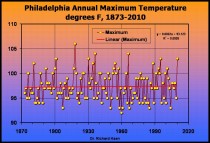
I think the graph speaks for itself - the trend line (plotted in red) is rather flat, with an upward trend of 0.2 degrees F per century. If that continues for another century, the old town will heat up another 0.2 degrees and turn into an inferno. As for the question of more heat waves, before 1942, the mid-point of the data, Philadelphia enjoyed 9 years in which the maximum temperature exceeded 100 degrees. For the second half of the record, since 1942, there were, well, 9 years. Not much of an increase. If that trend continues, I would expect another 9 years with 100+ degree temperatures by 2060.
STANFORD - ANOTHER SOURCE OF HOT AIR CHIMES IN
Oh my God, I’m going to fry!!!
Watt’s up with that posted a prediction by Noah Diffenbaugh at Stanford that heat waves will increase across the U.S. over the next few decades, with the largest increases being in the higher elevations of the Rockies, especially Colorado (figure enlarged here).
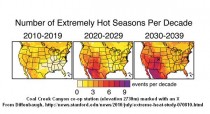
Since I live at 9,000 feet above sea level in central Colorado, I’m terrified! I don’t think I can handle more days over 80F (it’s never reached 90 here). Since CO2 has already increased by 110 ppm, any effects of increasing atmospheric carbon should be noticeable by now. Here’s a chart of the highest temperature recorded in the state of Colorado for each year since 1888 (figure enlarged here).
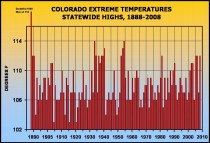
The hottest recorded in the state is a pretty good indicator of the occurrence of heat waves, and a trend should indicate a change in heat wave frequency. I didn’t want to break the beauty of the graph by plotting the linear trend line, which is essentially horizontal with an upward trend of about 0.5F over the 120 year period. That would indicate little change in the occurrence of extreme heat in Colorado.
Is extreme heat getting more frequent in Colorado? During the first half of the record, from 1888 to 1947, Colorado had 17 years in which some place in the state reached 110F or higher. Since then, there’s been 15 year with 110-degree readings. It appears that Colorado heat waves haven’t gotten the word that they’re supposed to increase with the rising CO2 levels. It also appears that I needn’t worry about a 90-degree day at my weather station for a while (that’s one reason I moved here).
Steve Goddard has a wonderful post on Watt’s Up With That detailing trends (or the lack thereof) in Colorado’s summer climate. He shows high temperatures have been declining in most of Colorado over the last 80 years, as CO2 has gone from 310 to 390 ppm.
Here’s a broader look at Colorado’s climate - annual statewide mean temperatures for 160 years of record from four sources. The data shown (enlarged here) are:
(1) NCDC combined divisional averages for the state;
(2) USHCN and Hadley CRU gridded values for the Colorado “box” (USHCN and Hadley are so similar they are averaged into one time series);
(3) NCAR-NCEP reanalysis surface temperatures for the Colorado “box”; and
(4) Regional averages from stations in Colorado and neighboring states before 1895, when there were fewer stations in Colorado.
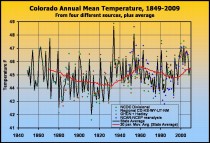
There’s a wealth of information here and many possible interpretations. The 30-year running mean emphasizes the PDO and AMO contributions. Colorado appears to follow neither oceanic oscillation very closely, but rather appears to respond to a mix of both oscillations.
More important is the lack of an overall trend in the temperatures. Colorado is predicted by many models to have the greatest warming of any state in the “lower 48”, but so far this warming is not evident. The warmest 30-year period remains 1933-1963 at 45.6F, 0.1F warmer than the most recent 30 years and 0.3F warmer than the first 30 years (1850-1879). The net warming from 1850-79 to 1980-2009 is all of 0.2F.
Although a warming signal is not evident over the entire record, there has been a warming since 1900 (which is what NCDC and others advertise as evidence of a warming Colorado). Even if one chooses to ignore the cooling after the warm 1860’s and concentrate on the 20th century, the bulk of the warming of that century occurred in a few years around 1930 - a bit early to be due to CO2.
Permalink here. More complete analysis can be found here. Note: RSS feeds now working for all posts(http://icecap.us/index.php/rss).
July 8, 2010 - by Christopher Horner
July 7 was the start of the running of the bulls in Pamplona - an exhilarating test of one’s Darwinistic chops (Washington Times caption of the below photo: “Christopher Horner is partially seen in the lower left-hand corner, pushing a slower Spaniard out of the way at the running of the bulls"). It is a fitting time to examine President Obama’s persistent running with the bull about a supposed Spanish economic miracle.
 Horner at the Running of the Bulls in Pamplona in 2000.
Horner at the Running of the Bulls in Pamplona in 2000.
El toro's most recent charge came this past weekend in Obama's weekly radio address. In it, he left no doubt that he is either an extremely slow, stubborn learner, or he cares not a whit about how the drama he is scripting will play out.
Recall that, on eight occasions in the past, Obama hailed Spain as his model for the centrally planned "green" (energy-constrained) economy of windmills and solar panels he vowed to impose on us along with health care "reform" and spreading the wealth around. Yet as of his recent Oval Office pitch for the same agenda, Obama no longer points to any such examples when insisting on what he calls "the right thing to do" even if you doubt the global warming claims that used to propel this tenet of the modern statist.
The new argument is laid out in the Sunday Washington Post headline: “Obama: Solar power will create jobs.” We see that despite public outrage over Washington, D.C., boondoggles, cost is not a consideration when ramming through “investments” in what Obama wrongly and risibly calls “new technologies;” i.e., wind and solar power:
President Obama announced the award of $1.85 billion in loan guarantees Saturday to two solar power companies that he said will create thousands of new jobs.
In his weekly radio and Internet address, Obama said the money from the Energy Department will help the U.S. transition to a “clean energy economy” that creates hundreds of thousands of jobs in the future.
Abengoa Solar, a unit of the Seville, Spain-based engineering company, will receive a $1.45 billion loan guarantee to build a solar power plant in Arizona that will create 1,600 construction jobs and 85 permanent jobs, according to White House documents released in conjunction with Obama’s address.
So the Spaniards’ enterprise carries a per-job cost of $860,534, even though 95% of those jobs are temporary (we learned they likely all are in the same way that census jobs are: the job disappears when the federal support ends). Wow. And proponents even embarrassingly boast that solar power requires more workers than any other energy source. This could get expensive.
Also using White House figures, if you assume the actual cost to the taxpayer for the loan guarantee is 10% of the loan, there is a per-job subsidy of $86,000.
This project brings to life the reason that both the president of Spain’s renewable energy association and the communist trade union called Professor Gabriel Calzada “unpatriotic” for revealing that these schemes are uneconomic drains: Spain needed the United States, Uncle Sucker, to buy into the scheme just to keep them afloat, as I detail in Power Grab.
The administration’s latest line in pushing this waste - it has merit because it would produce jobs - is vacuous. Everything you rob from Peter to pay Paul to do “creates jobs.” Thatís not an argument. You can dig ditches and fill them back up for less. And that, believe it or not, is less economically harmful by far, as also detailed in Power Grab.
But the entire purpose of the renewables mandate and subsidy schemes Obama wants is to force you to buy electricity for a higher price than you would otherwise. These schemes, unlike ditch-digging, exist only because of crony capitalism. But-for heavy-hitting wind and solar rent seekers like GE - and before them the unfortunate Enron tag-team with BP to pioneer the field - there would be no “market” for these energy sources abandoned as soon as we liberated the hydrocarbon. All of these projects also bring increased debt to underwrite the make-work, which through opportunity cost kills a multiple of the jobs “created” because the private sector creates jobs much more efficiently than the state.
The distinction is that state-sponsored ditch-digging does not necessitate higher energy prices, which chase other, largely manufacturing jobs to less hostile environments. But windmill and solar panel schemes did chase, e.g., European steel jobs to India and other exotic locations like Carroll County, Kentucky (North American Stainless, owned by Spain’s Acerinox). In short, you can make windmills from steel, but you won’t make steel using windmills.
Why the mandates? As the Institute for Energy Research found, despite receiving 100 times the subsidies of oil and gas, those favorite energy sources of the left (why might that be?), wind and solar, still can’t make it.
Federal Subsidies for Renewable Power Compared to Other Generating Technologies
While these are some of the more direct subsidies that wind and solar receive, there are many others at both the federal and state level, such as the accelerated depreciation mentioned above. The EIA did a study comparing the federal subsidies received for electric generation by fuel type for fiscal year 2007. ["Federal Financial Interventions and Subsidies in Energy Markets 2007”, Table 35 (pdf)] They found that wind and solar received almost 100 times more in subsidies than oil and natural gas plants on an electricity production basis. Total federal subsidies for electric production from wind power were $23.37 per megawatt hour (in 2007 dollars) and for solar power were $24.34 per megawatt hour, compared to 44 cents for traditional coal, 25 cents for natural gas and petroleum liquids, 67 cents for hydroelectric power, and $1.59 for nuclear. These subsidies include the federal production and investment tax credits, but do not include accelerated depreciation (a five-year tax write-off) and state subsidies. Energy subsidies are paid for by consumers and tax payers; they are not free.
All of which Spain (and Obama’s other model Germany) learned, but Obama refuses to, even if we can safely assume he was told this by his sudden abandonment of directing us to Spain’s or Germany’s experience as his model after their truths were exposed. By now deciding against telling us what model he is following, he believes he can keep from us how it turned out there, and will turn out here.
It is almost as if our president wants the comparisons to Jimmy Carter. Claiming that taxpayer-funded solar power is the way of the future is about as good a way to guarantee them as any. Even Jon Stewart is mocking Obama for recycling failed plans of the past. But this isn’t funny any longer. Read more here.
By Anthony Watts
I never thought I’d see this from MSNBC. But, here it is, your chance to weigh in. Of course the choices are rather weird, but then so is MSNBC. Make some noise, maybe Olberman will label me as the “worst person in the world”. Heh.
Their question:
Are you satisfied with the British panel’s conclusion that while ‘Climategate’ scientists were not always forthcoming, their science was sound?
Vote here.
---------------
How Unusual the Triple Digit Heat in the Big Apple
By Joseph D’Aleo, CCM
In the amazing winter of 2009/10 when the southeast had the coldest winter since 1977/78 and longest duration of sub 80F days in history, all time record snows fell in the Mid-Atlantic, Europe reported the coldest and snowiest winter in places since 1977/78 or 1962/63, Russia the snowiest and coldest in decades and in Siberia perhaps the coldest winter ever. North China had the coldest weather since 1971/72 with paralyzing snows.
Last winter, Joe Romm and others in the alarmist media angrily argued that the long time or all time record cold and snows in many locations around the Northern Hemisphere was “weather and not climate” and should be ignored. They especially took exception to the cooling might be a sign of things to come. In his typical duplicitous fashion, he on his latest Climate Progress posts is claiming this northeast heat is proof of global warming and signs of things to come. He was joined in this comment by Dr Tom Peterson, the environmental extremist at NCDC who is largely responsible for engineering and justification of the manipulation of NOAA data to enhance apparent warming. Attempts to contact Hansen and Schmidt at NASA GISS for comment were unsuccessful (busy taking language courses in Arabic?).
First of all, the heat is concentrated in the northeast with much of the rest of the country more normal.
How unusual is 100F heat in New York City? It doesn’t happen every year, but it is not unprecedented. This past winter was an El Nino winter and developing La Nina summers following El Nino winters tend to be hot. Below is a table of 100F days in Central Park, New York City since 1930 (enlarged here).

We may touch 100F again today in Central Park. The heat will slowly fade as the winds turn moren onshore in the northeast and moisture and clouds increase. Eventually a cold front with showers and storm will restore more normal readings by and during this weekend. More heat surges may follow this summer, until enough rains come (perhaps with tropical systems).
By the way, any blackouts can be considered signs of our future given the misguided green agenda. We are not building the energy infrastructure to meet growing needs especially in times of stress. As they found in Europe, wind and solar did not save any energy (active backup generation was needed) and wind was not there when needed the most on the coldest or hottest days.
-----------------
June 2010 UAH Global Temperature Update: +0.44 deg. C
By Dr. Roy Spencer

The monthly global, hemispheric and tropical anomalies are shown for 2009 through June 2010 enlarged here.
Plotted below (enlarged here).
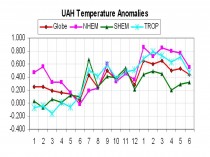
The global-average lower tropospheric temperature remains warm, +0.44 deg. C for June, 2010, but it appears the El Nino warmth is waning as a La Nina approaches (enlarged here.)
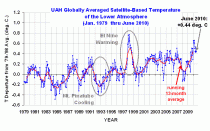
For those keeping track of whether 2010 ends up being a record warm year, 1998 still leads with the daily average for 1 Jan to 30 June being +0.64 C in 1998 compared with +0.56 C for 2010. (John Christy says that the difference is not statistically significant.) As of 30 June 2010, there have been 181 days in the year. From our calibrated daily data, we find that 1998 was warmer than 2010 on 122 (two-thirds) of them.
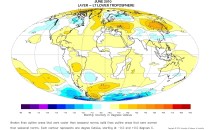
Enlarged here.
As a reminder, four months ago we changed to Version 5.3 of our dataset, which accounts for the mismatch between the average seasonal cycle produced by the older MSU and the newer AMSU instruments. This affects the value of the individual monthly departures, but does not affect the year to year variations, and thus the overall trend remains the same as in Version 5.2. ALSO...we have added the NOAA-18 AMSU to the data processing in v5.3, which provides data since June of 2005. The local observation time of NOAA-18 (now close to 2 p.m., ascending node) is similar to that of NASA’s Aqua satellite (about 1:30 p.m.). The temperature anomalies listed above have changed somewhat as a result of adding NOAA-18.
[NOTE: These satellite measurements are not calibrated to surface thermometer data in any way, but instead use on-board redundant precision platinum resistance thermometers (PRTs) carried on the satellite radiometers. The PRT’s are individually calibrated in a laboratory before being installed in the instruments.]
See post here.
WASHINGTON - The White House’s top energy adviser acknowledged that smaller oil firms might no longer be able to drill in the Gulf of Mexico as a result of legislation moving through Congress that would eliminate the cap on their liability for oil spills.
“Maybe this is a sector where you really need large companies who can bring to bear the expertise and who have the wherewithal to cover the expense if something goes wrong,” Carol Browner, special adviser to President Barack Obama on energy and climate change, said in an interview. Eliminating the $75 million cap on liability for oil spills “will mean that you only have large companies in this sector,” she said.

White House energy and climatechange adviser Carol Browner.
On other topics, Ms. Browner said the Obama administration would be happy with a scaled-back energy bill this year “just to get started.” She said the administration is mindful of the effects of a deepwater-drilling moratorium and wants “to get people back to work,” but wants first to understand what caused the BP PLC oil spill in the Gulf of Mexico.
The administration has imposed a now-challenged moratorium on deepwater drilling while a presidential commission conducts a six-month investigation of the BP disaster. Oil companies have been pushing the Interior Department to lift the moratorium, saying that new safety regulations could allow drilling to resume.
“The small companies did nothing wrong - and you’re going to shut them down?” said Robert Dillon, a spokesman for Sen. Lisa Murkowski (R, Alaska.) “So the only thing you are going to have left are the big, national oil companies like China. Where are the free-market values in that?”
Ms. Browner said lifting the moratorium would depend on developing better spill-response plans and an understanding of the cause of the Deepwater Horizon explosion. “We’re keenly aware of the impact of the moratorium,” she said.
Discarding the liability cap is a potent issue on Capitol Hill as oil continues to leak into the Gulf. Small companies have warned that discarding limits would shut out all but the biggest companies from offshore drilling, partly because obtaining insurance would become impossible without liability limits.
BP has paid out more than $132 million in damage claims and has promised to honor all legitimate claims despite the statutory liability cap. Under pressure from the White House, the company also has promised to put $20 billion into a fund to compensate residents for economic losses.
“There are still other damages to come - for example, natural-resource damages that BP will ultimately have to pay,” Ms. Browner said.
Oil is expected to continue leaking until at least mid-August, when the first of two relief wells is supposed to shut off the well.
Ms. Browner added that “we don’t want to see BP go out of business, because we’ve got lots of claims that need to be paid."Senate Democratic leaders are planning to use a broader energy package as a vehicle to discard the liability cap. The package has stalled in the face of opposition from coal and manufacturing states to mandatory reductions in greenhouse-gas emissions.
Last year, the Obama administration called for economy-wide emissions reductions, but the White House has become willing to consider an approach that would limit emissions only from the utility sector, suggesting action on an energy bill may be possible this year.
“Something that gets us started is something we will take seriously,” Ms. Browner said. She suggested Mr. Obama wasn’t ready to give up on setting a cap on carbon-dioxide emissions. “He continues to believe that a cap on carbon is very, very important. See post here.
By Leo Hickman
Climate scientists in the US say police inaction has left them defenceless in the face of a torrent of death threats and hate mail, leaving them fearing for their lives and one to contemplate arming himself with a handgun.
The scientists say the threats have increased since the furore over leaked emails from the University of East Anglia began last November, and a sample of the hate mail sent in recent months and seen by the Guardian reveals the scale and vitriolic tone of the abuse.
The scientists revealed they have been told to “go gargle razor blades” and have been described as “Nazi climate murderers”. Some emails have been sent to them without any attempt by the sender to disguise their identity. Even though the scientists have received advice from the FBI, the local police say they are not able to act due to the near-total tolerance of “freedom of speech” in the US.
The problem appears less severe in the UK but, Professor Phil Jones, the UEA scientist at the centre of the hacked email controversy, revealed in February he had been receiving two death threats a week and had contemplated suicide. “People said I should go and kill myself,” he said. “They said that they knew where I lived. They were coming from all over the world.” The third and final independent review into the issues raised by the hacked UEA emails is due to be published on Wednesday when Sir Muir Russell presents his panel’s conclusions.
Professor Stephen Schneider, a climatologist based at Stanford University in California, whose name features in the UEA emails, says he has received “hundreds” of violently abusive emails since last November. The peak came in December during the Copenhagen climate change summit, he said, but the number has picked up again in recent days since he co-authored a scientific paper last month which showed that 97%-98% of climate scientists agree that mankind’s carbon emissions are causing global temperatures to increase.
Schneider described his attackers as “cowards” and said he had observed an “immediate, noticeable rise” in emails whenever climate scientists were attacked by prominent right-wing US commentators, such as Glenn Beck and Rush Limbaugh.
“[The senders] are not courageous people,” said Schneider. “Where are they getting their information from? They just listen to assertions made on blogs and rightwing talkshows. It’s pathetic.”
Schneider said the FBI had taken an interest earlier this year when his name appeared on a “death list” on a neo-Nazi website alongside other climate scientists with apparent Jewish ancestry. But, to date, no action has been taken.
“The effect on me has been tremendous,” said Schneider. “Some of these people are mentally imbalanced. They are invariably gun-toting rightwingers. What do I do? Learn to shoot a Magnum? Wear a bullet-proof jacket? I have now had extra alarms fitted at my home and my address is unlisted. I get scared that we’re now in a new Weimar republic where people are prepared to listen to what amounts to Hitlerian lies about climate scientists.”
Dr Kevin Trenberth, head of the climate analysis section at the National Center for Atmospheric Research in Colorado, said he has also been receiving similar emails since last November when a private email of his was released into the public domain in which he had said: “The fact is that we can’t account for the lack of warming at the moment and it is a travesty that we can’t.” Trenberth has gone on to repeatedly defend his email and explain its context, but says he has now sent a file of abusive emails totalling “19 pages of text at about 10pt font” to his university’s security officials. He said the response of the US police had been “pathetic”, but also blamed it on freedom-of-speech legislation.
Professor Michael Mann, director of the Earth System Science Center at Pennsylvania State University and leading proponent of the “Hockey Stick graph”, said his experiences of hate mail were “eerily similar” to those described by Schneider. “I’m not comfortable talking about the details, especially as some of these matters remain under police investigation,” he said. “What I can say is that the emails come in bursts, and do seem to be timed with high-profile attack pieces on talk radio and other fringe media outlets.”
Last month, Mann told ABC News in the US that the following message was typical of the emails he has been receiving: “Six feet under with the roots is where you should be. I was hoping I would see the news that you’d committed suicide. Do it, freak.” Another climate scientist, who wished to remain anonymous, said he had had a dead animal dumped on his doorstep and now travels with bodyguards.
Dr Gavin Schmidt, a climatologist at NASA’s Goddard Institute for Space Studies in New York and co-author of the RealClimate website, said he had chosen to adopt a different strategy and now largely ignores the abusive emails he receives. “I learned a while ago that there is no way to prevent people who have no idea who you are, or what you think, or what you do, using your name to project their problems onto,” he said. “Should I be offended and get annoyed, or should I just look upon my interlocutor with bemusement and pity?”
UK-based climatologists working outside of UEA report they have received far fewer abusive emails compared to their US counterparts. Dr Myles Allen, head of the climate dynamics group at University of Oxford’s Atmospheric, Oceanic and Planetary Physics Department, said he only tends to get such emails when he writes an article in the press and that they “tend to start off ‘Dear Communists, know that you will fail.’”
“I suspect part of the reason people feel they have to attack climate scientists is that politicians and environmentalists have a tendency to hide behind the science,” he said. “In the run-up to Copenhagen, we often heard the phrase ‘the science dictates’ - that we need a 40% cut in rich-country emissions by 2020, for example - when in fact only a very specific, and politically loaded, interpretation of the science implied any such thing. If people who claim to be on the side of the science use scientists as human shields, it is hardly surprising that the scientists end up getting shot at.”
Dr Peter Stott, head of climate monitoring and attribution at the Met Office’s Hadley Centre, said he had had “mercifully few” abusive emails or letters compared to scientists in the US. “I do get letters and emails accusing me of being wrong and stupid, but I have received few really abusive ones. I got one accusing me of being a communist, but so far at the Met Office at least we haven’t been on the receiving end of the types of hate mail the US scientists have apparently been getting. Also in Australia, I hear.” See post here.
Schneider email is: shswebsite@lists.stanford.edu
These clowns have been criticizing and demeaning publically anyone who stood in their way or challenged their religion. The alarmists create lies about our motivation, our funding (in reality non-existent), our expertise and our well supported findings. They refuse to debate the skeptics for fear that the alternative thinking would be exposed and our scientific credibility elevated. Wait to see what happens when their theory finally collapses. No one advocates harm, but they should pay the financial price for their meteorological Madoff impersonation.
------------------
“Climategate" report due Wednesday
Posted by Eben Harrell Monday, July 5, 2010
A review into the chain of emails from the University of East Anglia’s Climatic Research Unit (CRU) that caused an international scandal when they were leaked last year is due out on Wednesday.
The Independent Climate Change Email Review, headed by Sir Muir Russell, a former civil servant, will examine emails between top climate scientists that climate skeptics say reveal secret deals done during the writing of reports for the UN’s Intergovernmental Panel on Climate Change (IPCC) and efforts to cover-up of uncertainties in the evidence used to support anthropogenic climate change.
The highly anticipated findings from the independent inquiry will be a “game-changer” for climatologists, Mike Hulme, professor of climate change at the University of East Anglia, told The Guardian Newspaper. He said that climategate has already changed the tone of climate science. “The community has been brought up short by the row over their science. Already there is a new tone. Researchers are more upfront, open and explicit about their uncertainties, for instance,” he said.
By Klaus Ermecke
Introduction
If one believes politicians and the media, the world is in danger: the earth is heating up - catastrophe will result - and civilization is the cause! Even school children are frightened and taught that mankind can and must save the climate.
In spite of the rising burdens imposed on almost all businesses and citizens, few politicians have questioned the “fight against climate change”. Over years, hardly a newspaper challenged the scientific basis of the “greenhouse” dogma. If asked, its proponents referred to a “scientific consensus” regarding “human made climate change”. Accordingly, dissenting opinions had to be unfounded and were not worth consideration.
However, thorough review of the pertinent scientific literature and questioning of experts reveals that there is in fact no consensus at all regarding the so-called “greenhouse effect”:
Almost all scientific papers related to “greenhouse effect”, “climate change” and the supposed human influence do not critically examine these statements, and instead simply assume them to be true.
There are tens of thousands of publications in which the authors either find no relation to “climate change”, or even explicitly reject the concepts on which “climatologists” have based their assumptions. (ICECAP NOTE: overstated number though such papers or posts certainly exist)
There are in fact several different “greenhouse gas theories” based upon very different physical assumptions. The commonly believed notion that increased CO2 will catastrophically warm the planet does not hold up to scientific scrutiny and the laws of physics.
Summary of our most important results:
* The Earth has a natural “cooling system”. It continuously radiates energy into space.
* Any increase in temperatures automatically boosts this radiation. The cooling power jumps up.
* “Global warming” (i.e. a general increase of temperatures) requires this incremental cooling to be compensated by an increase in heating power.
* Accordingly, in order to achieve “global warming”, CO2 had to increase the flow of energy from outside the system to the Earth’s surface. But this is beyond even the claimed capabilities of this gas. Therefore CO2 cannot cause any warming.
* IR gases ("greenhouse gases") cool the Earth. The “natural greenhouse effect” (i.e. the warming) is a myth.
* Climate variability did and does exist. However, the CO2 level in the atmosphere is not the cause. Aside from the sun itself, changing cloud coverage is the main factor.
See this full detailed and well documented report here. Hat tip Dr. Michael Economides, University of Houston.
By Damien McElroy, Foreign Affairs Correspondent
By painting the mountains, Eduardo Gold hopes to replicate the effect of Andean glaciers, which reflect back sunlight and hence heat back through the atmosphere.
The technique is scientifically plausible and, according to some scientists, may be the only method of lowering global temperatures in a crisis. “A white surface reflects the sun’s rays back through the atmosphere and into space, in doing so it cools the area around it too,” said the 55-year-old activist. “In effect in creates a micro-climate, so we can say that the cold generates more cold, just as heat generates more heat.”
It is hoped the project will slow the melting of the glaciers.
Four workmen have been given the task of painting three peaks, starting with Peru’s Chalon Sombrero peak, which lies 4,756 metres above sea level.
Chalon Sombrero, like many of the Andean peaks, has seen its glacier disappear within living memory.
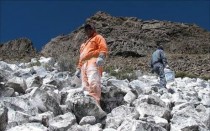
The painters who have already completed two hectares of a planned 70 have been recruited from Licapa village, which depends on the run-off from the mountain for its water.
The project is a low technology remedy for global warming. The workers use an environmentally-friendly mix of lime, industrial egg white and water, which is known to have been used since Peru’s colonial times
The whitewash is slopped out on the slopes from jugs.
If the underlying theory, which is known as Solar Radiation Management, works the glacier should re-emerge in a cooler micro-climate.
The 135,000 pound project is funded by the World Bank after Mr Gold won a “100 Ideas to Save the Planet” competition last year.
The World Bank last year estimated that 22 per cent of Peru’s glaciers have melted since 1980 and there are projections that all the country’s glaciers could disappear in the next 20 years.
While novel the painting scheme is not the only outlandish way of tackling global warming proposed. Firing mirrors into space to reflect the sun’s rays, or feeding cattle garlic to reduce methane emissions have been mooted.
Locals who have witnessed the destruction of the glaciers are strong supporters of Mr Gold’s scheme. “All the peaks here should be painted in this way,” said Pablo Parco Palomino. “That way there would be as much water as there was before the glacier disappeared, and that would mean more pasture to support more livestock.”
But Antonio Brack, Peru’s Environment Minister, told the World Bank that its funding would be better spent on other “projects which would have more impact in mitigating climate change.”
He said: “It’s nonsense.”
Mr Gold believes he can put the theory into practice and get results. “I’d rather try and fail to find a solution than start working out how we are going to survive without the glaciers, as if the situation was irreversible,”
Steven Chu, the US Energy Secretary, has endorsed installation of white roofs to help prevent climate change, an idea seen as more logistically feasible than painting mountain peaks.
ICECAP NOTE: As Anthony has been doing his lecture tour of Australia, I am also in the Southern Hemisphere doing climate missionary work in Brazil and given another 28 hours of air travel before I get back Monday afternoon, there will be no posting for about a day. Thanks for your understanding, obrigado! By the way, the 100 degree heat wave in the east this week is classic summer post El Nino east QBO behavior. New York City had 4 100F degree days in late June and July in 1966 after the moderately strong 65/66 El Nino. It had 3 100F degree days in 1977 after the weaker El Nino east 76/77 event. 1995 following the 1994/95 El Nino saw temperatures top 100 once.
By Dr. David Stockwell
Ken Stewart is engaged in the first ever independent study of the complete High Quality Australian Site Network. Ken has a series of posts, the first including a lot of background information and explanation. Subsequent posts are not be as long and part 6, the data from the Victorian sites has just been done.
Like many people, he thought that the analysis of climate change in Australia, and information given to the public and the government, was based on the raw temperature data. He was wrong. He averaged maxima and minima for all stations at each site, then compared the result with the High Quality means. By these calculations (averaging the trend at each site in Victoria) the raw trend is 0.35 degrees C per 100 years, and the High Quality state trend is 0.83C. That’s a warming bias of 133%! (below, enlarged here).
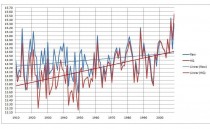
See post and comments here.
---------------
Californian’s can now block new taxes and lost jobs by voting on proposition 23
![]()
See post and comments here.
By the California Jobs Initiative
Californians can lead the way on blocking new taxes and lost jobs. They can now vote YES on Proposition 23! (formerly AB32)
The Secretary of State announced yesterday that the California Jobs Initiative will be Proposition 23 on the November ballot.
The California Jobs Initiative is headed to the November ballot! In an overwhelming show of support, with over 800,000 signatures submitted throughout the state, California voters will now decide the timing of AB 32 implementation.
The qualification of this measure will now give Californians a chance to decide between saving California’s economy or sacrificing a million jobs and billions of dollars on new ineffective environmental regulations.
With nearly 2.3 million Californians unemployed and persistent annual budget deficits in the range of $20 billion, the state’s economy can’t sustain Proposition 23 (AB 32’s) enormous costs and additional job losses.
Sacramento politicians passed AB 32 which amounts to a new $60 billion energy tax that will kill jobs in California. It’s being implemented by legions of bureaucrats and a huge bureaucracy that admit it will do virtually nothing to solve global warming. Here’s the price tag we’re being asked to pay for an ill-conceived, flawed and ineffective proposal:
Over 1.1 million lost jobs (Sacramento State University Economist)
Up to 60 percent higher retail electricity rates (Southern California Public Power authority)
8 percent increase in natural gas costs (CARB)
$3.7 billion in higher gasoline and diesel costs (Sierra Research)
Possible $143 billion cap and trade auction tax to offset AB 32’s higher energy prices and job losses (CARB Economic Allocation and Advisory Committee)
Join the coalition here.
Send the politicians a message:
NO ENERGY TAX. NO MORE LOST JOBS
That means a Yes vote on Proposition 23 would:
- Save more than one million jobs.
- Stop billions in higher energy costs.
- Stop higher car taxes.
- Avoid a $500 million water tax.
Thank you for all of your support. With help of concerned Californians like yourself, the California Jobs Initiative will be on the November ballot and Californians will have a voice in this important measure. Vote Yes on Proposition 23!
(and they should know - surely - they run the weather station!)
By Verity Jones, Working in the Clay
“Unprecidented ice melt” being the big story in the Arctic, the temperatures here peaking in 2005 are certainly part of that story. But it is a story pushed by those with short memories or a blinkered field of view. In looking for modern photos of the weather station, I came across a gem - I stumbled on a sailing blog that included a voyage to Greenland. Sailing being a passion from childhood and the source of my weather obsession I couldn’’t resist reading er, rather a lot of it. Jim and Jean Foley arrived in Nuuk in the West of Greenland in July 2007. They had an obvious interest in how the climate is affecting Greenland, asking one guest, a student, about it, who said:
“...Disko Bay used to freeze over enabling dogsleds to cross the ice from his home on Disko Island to the mainland for most of the year. The last freeze was ten years ago. Now, helicopters are the only link when the brash ice gets too thick for boats.”
Down the steps Prins Christian Sund from the Weather Station. Image. In mid-August 2007 they were, briefly, guests of the weather station at Prins Christian Sund, and spent what sounds like a very pleasant evening having dinner with the station operators.
“We called ahead to the Danish weather station perched next to its antenna farm on the last wind blown mountain top at the eastern entrance of the sound. We had hoped to be able to tie their pier for our last night before leaving for Ireland. We were granted permission.
The station was originally built during WWII as a US weather base for 30 weather men and telegraph operators. Today, airplanes on the transatlantic run rely on its data. The march of technology has made it fully automatic and reduced the staff to three, a maintenance person, a cook and a manager.
Their number of annual visitors can be counted on one hand. We arrived to find Oleg, the manager and most of the staff waiting to help us tie up on their dock. We were invited to climb up to the station for a shower and dinner.
We gathered our clean clothes and climbed the stairs to find a compound of buildings tied down by a spider web of steel cables to keep them from blowing away.
After cocktails, dinner with wine and desert with schnapps we discussed global warming (they believe it is cyclical) and life in the universe (there must be).”
The weather station operators at this station believed global warming is part of a cycle.

Greenland - weather stations with a long record (enlarged here)
If this concept is new to you, there is plenty of evidence to support it from weather stations in the region (map left; scroll down for graphs), and it is throughly discussed on many sites and blogs. Alan Cheetham at Appinsys has a summary of recent and historical temperatures in Greenland and a couple of his figures are reproduced below. Tony Brown of Climate Reason has also researched the subject from a historical viewpoint and had a great post on Watts Up with That (Historic Variation in Arctic Ice) this time last year. Thanks to Tony I also became aware of a website and book How Spitsbergen Heats up the World, from which I reproduce the following figure: It is also possible to compare the rate of warming and see that the trends for many Arctic stations are comparable on interactive maps for the periods 1910-1939 and 1990-2010 but contrast with the cooling period 1940-1969 (see also Mapping Global Warming).

(enlarged here)
Going back to Alan Cheetham’s graphs, he has calculated the temperature anomalies for long-lived weather stations in Greenland. The graph below clearly shows the cyclical nature of the temperature anomaly, and also that the rates of warming are similar in the 1920s to currently. He has also superimposed the average temperature anomaly on the AMO.
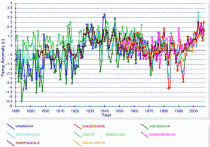
Temperature anomaly history of GHCN stations in Greenland (reproduced from here, enlarged here).
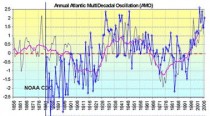
Averaged temperature anomaly for longlived Greenland GHCN stations overlay on the Annual Atlantic Multidecadal Oscillation index (Figure from Appinsys, enlarged here).
Going further back in time, ice core data (oxygen and nitrogen and argon isotopic ratios), sediments and many other proxies are reviewed here. So no more talk of unprecedented ice melt or warm temperatures in the Arctic. People using such language are: pushing an agenda, have not looked at the length and breadth of the data, or have short or selective memories.
See full post here.
By Ken Haapala, Executive Vice President, Science and Environmental Policy Project (SEPP)
This week was marked by a blowout that may have greater ramifications than the BP blowout in the Gulf of Mexico. The Proceedings of the National Academy of Sciences published a survey of literature entitled “Expert credibility in climate” by Anderegg, Prall, Harold and Schneider that claims:
(i) 97-98% of the climate researchers most actively publishing in the field support the tenets of ACC [Anthropogenic Climate Change] outlined by the Intergovernmental Panel on Climate Change, and (ii) the relative climate expertise and scientific prominence of the researchers unconvinced of ACC are substantially below that of the convinced researchers. (Boldface added)
After ClimateGate, warming advocates declared they must communicate better with the public. Apparently, some believe they can communicate better with the public not by demonizing carbon but by demonizing those who challenge their views, by attempting to demonstrate the challengers are somehow unqualified. The keyword “climate deniers” is a tip-off to those who think that based on physical evidence, climate change is largely natural, not human caused. Already, blacklists have been drawn up with names of those who challenge the orthodoxy. Sometime in the future, it may be useful to compare the allocation of funding with names on the lists to assess the objectivity of those who control climate change funding.
By publishing this survey and its conclusions, the National Academy of Sciences is approaching a low perhaps not seen since eugenics was in vogue. Please see Roy Spencer’s comments and the articles referenced under “The Empire Strikes Back.”
*************
This Week will begin a new feature called “Number of the Week” borrowing from “Number of the Month’ posted by John Brignell in Numberwatch. Last week it could have been 196 - the number of dead birds found in the Gulf of Mexico with visible oil as reported by US Fish and Wildlife. As of June 24, with 65 days of reporting, that number is 282. By way of comparison, according to a FAA 18 year study ending in 2008, the number of birds reported to be involved in strikes with civilian aircraft averaged 409 per month. Thus far, SEPP has been unable to find a report for the US of the number of birds that encounter the blades of wind turbines. ICECAP note: The world’s largest and most carefully monitored wind farm, Altamont Pass in California, is estimated to have killed between 2,000 and 3,000 golden eagles alone in the past 20 years (here). Meeting administration standards would mean the killing of at least 300,000 birds per year by wind turbines (here).
This week’s number is 1%. - the odds of a livable future according to EPA, if the Kerry-Lieberman cap and tax bill is not passed, as reported in Scientific American, which was the subject of last week’s science editorial.
**************
Confusion reigns over the BP oil spill. Reports claim that the US refused assistance from a number of foreign nations which have state-of-the-art technology for removing oil from water. For example, Dutch skimmers are considered to be among the best in the world and they are adept in cleaning up spills in the North Sea, which is generally rougher than the Gulf and subject to stronger currents. It is unclear why the administration refused the help. Some reports claim it is due to the Jones Act preventing foreign ships from engaging in such work in US waters, but President Bush suspended the Jones Act so foreign ships could help in the clean up after Hurricane Katrina. Other reports claim that the discharge from the skimmers violates EPA standards because not all the oil is removed - which would be an example of bureaucratic insanity. It is now reported that foreign skimmers are being used, weeks after the offer of assistance. Thus far, the administration has been silent on the issue.
A Federal District Court Judge has blocked the administration’s six month moratorium on drilling in waters deeper than 500 feet, citing it is causing unwarranted, significant economic harm to companies and communities involved. (An oil industry estimate, reported in Investor[s Business Daily, states the harm is as much as $330 million a month in direct wages alone.) The administration immediately declared it will challenge the finding, and it will re-institute a revised moratorium. Apparently, the administration is not concerned that independent owners of deep water drilling rigs, that cost as much as $500,000 a day to cover bank loans alone, will move their rigs to deep water locations that are not subject to US moratoriums, such as off the coast of Brazil. Once they move, it will be difficult to get them back. Typically, provisions for government interference are written into drill rig leases for countries such as Nigeria, but not for the United States - until now.
The administration’s appointments to a commission investigating the BP spill are not a positive sign. The expertise of the only engineer on the commission is not in a field related to petroleum production or drilling. The others are more concerned with policy than technical expertise. The lack of expertise makes this commission significantly different from the commission that investigated the Challenger disaster.
Various politicians are using the BP spill to justify shutting off drilling in other parts of the US, onshore and off shore. Apparently, they believe in the Beyond Petroleum slogan and that shutting off oil is a path to prosperity.
*************
The cap and tax issue in the US Senate remains murky. Although many pundits predict that a law by any other name will not pass, the health care bill was not supposed to pass either.
*************
As referenced below, the Sunday Times published a correction to its article on the Amazon rainforests, which admits that the base study, which was incorrectly referenced by the IPCC, was peer reviewed.
*************
On July 1, the Emissions Trading Scheme (ETS) will take effect in New Zealand. New Zealand farmers, who will be financially impacted by the methane emissions of their livestock, vowed to continue the fight against ETS. It appears they do not wish to be the first among lemmings.
*************
In a surprise move, avid cap and tax advocate, Australian Prime Minister Kevin Rudd was replaced this week by a member of his own party. It was not his program to institute a cap and tax scheme that did him in, on which he punted, but his scheme to place a super tax on the mining industry including coal. Evidently, leaders of the Labor Party believe vibrant industry including energy production is vital to a developed economy. If only US political leaders recognized this fact.
See the report here. Subscription is free of charge; send full name, background, occupation, location, etc. to comments@SEPP.org.
By Art Horn, The Art of Weather and Icecap
Recently president Obama told Arizona Senator Kyl that if he secured the boarder there, Arizona would have no motivation to support Obama’s immigration reform legislation. In other words Obama is playing politics with Arizona and its people to get what he wants. In most circles this is called blackmail. Could the president be doing the same thing with the oil spill in the gulf? Could he be stalling the clean up until he gets what he wants?
The Obama administration has said we can’t bring in skimmers from other parts of the country to help with the spill because there might be another spill someplace else. Excuse me my hearing aid must be turned off. Did he say we can’t help stop the worst spill in US history because of what might happen somewhere else? The answer is an unbelievable yes he did!
Obama has also refused the help of other nations. Belgium, The Netherlands and Norway have very sophisticated skimming technology, some of the best in the world. Obama won’t use them because he refuses to waive the Jones Act. This 1920s law requires that all ships working in American waters be made here and have domestic crews. Interestingly President George W. Bush waved the act in 2005 to help clean up after hurricane Katrina. Obama won’t do it. The worse the spill gets the better Bush looks.
That begs the question why? Why would the president of the United States who is sworn to protect the nation, refuse to use all tools at his disposal to help the people and the environment of the gulf. It’s the same reason he is blackmailing Arizona. He wants something. That something is Cap and Trade. It’s now called some kind of energy bill but don’t be confused it’s the same old Cap and Trade dressed up in new clothes. OK but how would delaying the cleanup help the president get his Cap and Tax legislation through? The answer is he is waiting for August and September, the peak of the hurricane season.
President Obama is a devoted disciple of the religion of global warming. On September 22nd 2009 Obama said “On shrinking islands families are already being forced to flee their homes as climate refugees. The security and stability of each nation and all peoples, our prosperity, our health and our safety are in jeopardy. And the Time we have to reverse this tide is running out.” He is a true believer of the first order. He believes that we can control the climate of the earth just like he controls the climate in the Oval Office. If it’s too warm the president just goes over the wall and turns down the thermostat. Similarly if the earth’s climate it too warm he will use Cap and Trade to turn down the amount of carbon dioxide in the air and cool the earth, as well as our economy I might add.
So where do the hurricanes fit in to all of this? The president is waiting for a hurricane to roar into the gulf this season and blow all that oil many miles inland and make a bad situation an order of magnitude worse. He is waiting for an Obamacane.
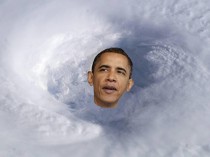
A hurricane would create a storm surge that would push the spill into the estuaries, rivers and backwaters all along the gulf where it strikes. This hurricane driven surge of water and oil would cause far more damage than has happened so far. It would take years to clean up. The ensuing economic damage to the region could last for a decade or more. Parts of south Florida and New Orleans are still recovering from major hurricanes and those storms were “clean”. This Obamacane would be a unique historical event. No hurricane has ever moved over a spill of this magnitude and blown it onto land, not in the history of the world.
Such a calamity, if it occurs would be the fuel (oil) on the fire Obama would need to get Cap and Trade done before the November elections. In the wake of the storm there would be a thunderous outcry from the environmental groups, companies desperate to profit from “green” government subsidies and Obama’s own spinmeisters to dump oil. It’s the perfect eco-disaster set up. An active hurricane season with a higher than usual chance of a large gulf hurricane and a massive oil spill waiting to be blown into history. This Obamacane would be exploited as the last straw needed to persuade American to “go green” for good and dump ugly oil and its climate destroying carbon emissions. See more here.
Icecap Note: A tropical wave in the Caribbean is being watched for possible development into the first Atlantic named system. Some models take it to the central GOM oil spill region. A North Atlantic analysis of the atmospheric precipitable water shown below courtesy University of Wisconsin CIMSS animates here).

By Greg Pollowitz
Senate Majority Leader Harry Reid (D-Nev.) is planning a high-risk, high-stakes strategy for bringing climate and energy legislation to the floor ahead of the August recess.
The gamble: yoking a bipartisan, fast-track measure to overhaul offshore drilling rules with a broad, contentious bill capping greenhouse gas emissions that otherwise would have almost no chance of passage on its own.
Reid’s own Democrats are mixed on the strategy for notching 60 votes. Some argue that public perception of fossil fuels in the wake of the BP oil spill will sway enough of the party’s swing votes and open Republicans to attack if they oppose the measure as their reelection campaigns head into the homestretch.
“Republicans are not supporting virtually anything to transform our energy system,” said Sen. Bernie Sanders (I-Vt.). “That’s not what the American people want. So I think you bring forth a strong bill, you rally the American people and I think the Republicans will respond as a result of that.”
The rest here.
Obama Administration vs. Bobby Jindal
The WSJ reports on the now halted berm project that’s supposed to protect Louisana’s wetlands:
In the latest twist in a controversy that has dragged on for weeks, the administration effectively ordered Louisiana officials Tuesday evening to temporarily stop building a line of sand berms east of the Mississippi River that the state officials see as crucial to protecting their fragile coastal marshes from incoming oil. Federal officials described the construction halt as necessary to prevent long-term environmental damage. Louisiana officials warned it could allow more oil to hit their shores right away.
Tom Strickland, the U.S. Interior Department’s assistant secretary for fish, wildlife and parks, said Louisiana officials had been building the berms in a way that violated conditions set out by the Obama administration when it approved the berm plan in late May. He said the state was dredging sand to build the berms from an offshore area that is too fragile, potentially intensifying erosion of the Chandeleur Islands, a chain of barrier islands the berms are designed in part to protect.
“You don’t want to destroy the village to save the village,” Mr. Strickland said in a call with reporters. “It’s a question of whether we’re going to impair that island chain in a way that it may not ever be able to be restored.”
But Louisiana Gov. Bobby Jindal, a Republican who has been critical of the Obama administrationís handling of the oil spill, decried the federal government’s move to curtail construction of the berms.
“We don’t have time for red tape and bureaucracy,” he said in his own news conference Wednesday. “We’re literally in a war to save our coast.” He added that he was “calling on the federal government to get out of the way.”
By Dr. Frank Clemente, Energy Facts Weekly
“… taxpayers will be required to pay to build Cape Wind and then required to buy its products at twice normal rates, opponents might have more success if they pointed out what a lousy deal it is ...” - Wall Street Journal, 2010
Electricity from wind is a worthwhile addition to electric grids throughout the United States. Fuel diversity is the linchpin of the electric reliability that serves as the foundation of modern society. But, as the forecast released last month by the Energy Information Administration in their International Energy Outlook 2010 confirms, wind-based electricity generation will play a very minor role in the electric supply system over the next several decades.
The Limited Role of Wind in U.S. Power Generation
In fact, wind power is projected to peak about 2015 when 4.7% of electricity will be produced by wind. Thus, after this current spate of turbine construction subsides, the relative role of wind will actually decline through 2035. (enlarged)
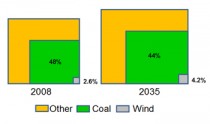
The constraints upon large-scale deployment of wind power are straightforward and well known. There is no free lunch in the energy business and the tab associated with greatly expanded dependence upon wind generation is just too risky and expensive - and probably not even possible.
The Cost of Cape Cod Wind-Based Electricity
Building 130 wind turbines, each as high as the Statue of Liberty, in Nantucket Sound will be expensive indeed. Beacon Hill Institute in Massachusetts estimated taxpayer funded subsidies alone will reach one billion dollars - giving wind investors an unseemly 25% return on equity. And then the real costs begin as electric rates follow an ever escalating trajectory based upon increases to which all parties have already agreed.
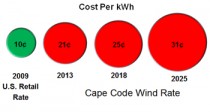
Cape Cod: The High Cost of Wind Generation (enlarged)
“This confirms the worst fears of many Massachusetts rate players and businesses,” - Alliance to Protect Nantucket Sound
Of course, most wind power in the U.S. will come from onshore but that is expensive as well. Professor Jay Apt at Carnegie Mellon University estimated wind based electricity on land could reach 20 cents per kilowatt hour - double that of coal even after CO2 was captured and stored. The Heritage Foundation came up with similar numbers, stating that the average family in the U.S. would pay $340 a month for electricity from wind as opposed to $189 from coal. But even this alarming number surely underestimates the cost of wind since coal provides half of the electricity in the United States and wind could never reach that scale of deliverability.
Wind Resources Abound - but on the Farthest Horizon
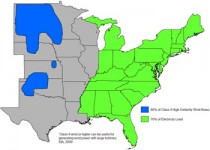
Geographic Dissonance: 80% of the Class 4 Wind is far removed from 70% of the Electricity Load (enlarged)
Indeed, an extensive study by major U.S. power pools found that for the Eastern U.S. just to get 5% of its power from wind will require over 10,000 miles of extra high voltage transmission lines. Considering that it takes about seven years to get one line approved and built, the prospects that wind will make a significant difference are about as remote as North Dakota.
Wind Takes Hot Days Off - And Cold Ones Too
The intermittency of wind is its real Achilles heel. Modern societies are replete with machines and electronic equipment based on the presumption of reliable electricity. Wind’s variability means it must be constantly backed up by another source - most likely natural gas with a price that can spike literally overnight. Thus, the cost involves not only building wind turbines and new transmission lines but also building standby natural gas peaking plants - a true double whammy for electric rates to families and businesses.
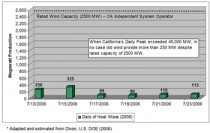
Hot? Wind Generation’s Performance during a California Heat Wave (enlarged)
COLD?
“During the January 2010 cold snap in the United Kingdom, wind was able to generate power at only 4% of its rated capacity. Jeremy Nicholson, Director of an Industrial Energy Consumers group, noted, “Even if we had 30 gigawatts of wind power, it wouldn’t have contributed anything of any significance this winter...” (UK, Telegraph)
NEVER ?
“Seven wind turbines launched near Bali during the United Nations Climate Change Conference in December 2007 have failed to deliver any of their promised power ... District head W. Sumarta acknowledged that the seven wind plants have never been operational .... ‘they are nothing more than monuments’ he said ... each wind turbine cost $325,000 US ...” - Jakarta Post, May, 2010
Major References:
1. Wall Street Journal, 5/12/2010
2. Alliance to Protect Nantucket Sound
3. Telegraph (UK), 1/11/2010
4. Jakarta Post, 5/2010
5. Heritage Foundation
6. EIA DOE
Dr. Clemente is a Professor at Penn State University where he specializes in research on the socioeconomic aspects of energy policy. His work has appeared in World Oil, Public Utilities Fortnightly, Oil and Gas Journal and a variety of other energy related media. The materials presented here are solely the responsibility of the author and do not represent Pennsylvania State University in any manner. Sign up for newsletter here.




